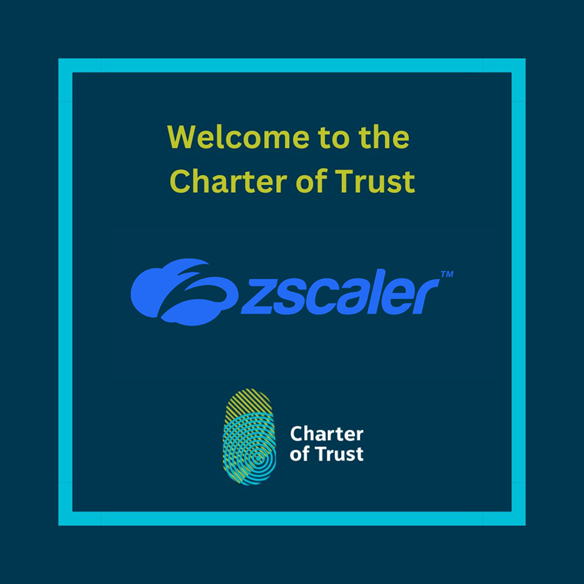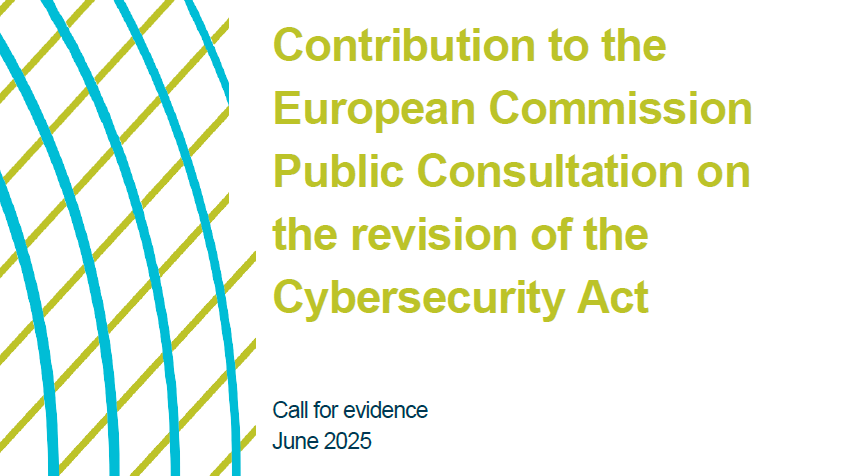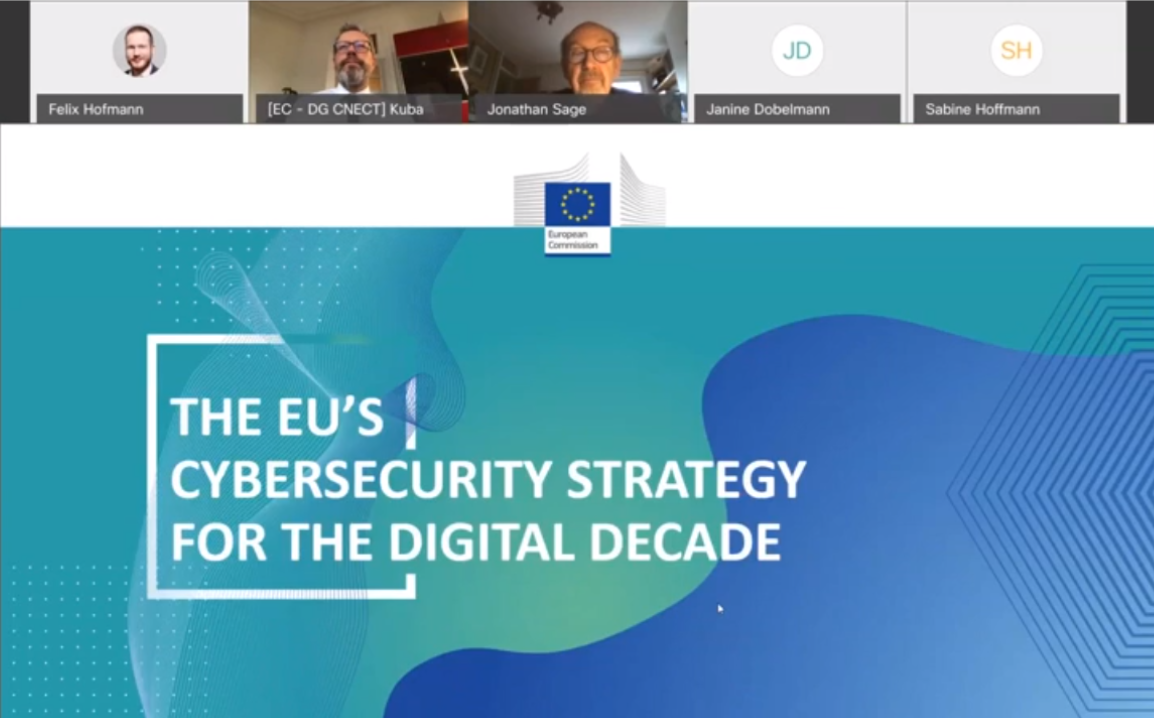From 25 January to 3 February, representatives from partner companies worldwide gathered virtually for the Charter of Trust’s first Collaboration Week of 2021 to continue growing the strategic outlook of the Charter of Trust, more than three years after its creation. This virtual Collaboration Week was characterized by vibrant and insightful presentations from global cybersecurity experts.
Amidst a global pandemic, public and private organizations around the globe have witnessed a sharp rise in online scams such as COVID-19 phishing emails. The SolarWinds hack underlined the importance of increasing cybersecurity efforts across all sectors. Collaboration and knowledge exchange are key pathways for the industry and other organizations to share best practices and collectively raise resilience against a growing and complex threat landscape.
Over the course of two weeks filled with working sessions and discussion rounds, Charter of Trust Partners met in taskforces each dedicated to one of the 10 Principles. The Principle Taskforces active during this Collaboration Week were Principle 2 “Responsibility throughout the digital supply chain”, Principle 3 “Security by default”, Principle 6 “Education”, Principle 7 “Certification for critical infrastructure and solutions”, and Principle 8 “Transparency and response”. The Principle Taskforces took stock of the work done since the previous Collaboration Week in June 2020 and set concrete objectives for the coming months leading toward the 2021 Munich Security Conference.
The Charter of Trust also convened its Associated Partner Forum (APF) to discuss ongoing developments and cooperation initiatives with its Associated Partners. The APF this time was joined by Germany’s Federal Office for Information Security, the Canadian Centre for Cyber Security, the Hasso Plattner Institute, Japan’s Ministry of Internal Affairs and Communications, and TU Graz.
In addition, keynote speeches from an impressive array of high-level experts in the field of cybersecurity were highlights of the Collaboration Week that sparked discussions within the taskforces on the various challenges and opportunities the industry is currently facing. The Charter of Trust was pleased and honoured to host:
- Scott Jones, Head of the Canadian Centre for Cyber Security
- Atsushi Umino, Director, Office of the Director-General for Cybersecurity, Ministry of Internal Affairs and Communications (MIC) of Japan
- Jakub Boratyński, Head of Unit for Cybersecurity and Digital Privacy, DG CNECT, European Commission
- Regine Grienberger, German Ambassador for Cyber Foreign Policy, German Federal Foreign Office
- Kiersten E. Todt, Managing Director of the Cyber Readiness Institute
- Raphael Yahalom, Research Affiliate, MIT Sloan School of Management
- Alexandre Dulaunoy and Andras Iklody, Computer Incident Response Center Luxembourg (CIRCL)
- Patrick Steinmetz, Cyber Risk Assessment Expert at BitSight Technologies
- Dmitry Raidman and Evgeniy Kharam, Co-Founders of the Security Architecture Podcast
The second virtual Collaboration Week of the Charter of Trust enabled an even closer collaboration among partners and exchanges with high-level external speakers through different sectors and time zones. After the success of Charter of Trust roadshows and webinars in 2020, additional online events are being planned to further advance the synergetic nature of the initiative, starting with the Brussels Roadshow on 25 February.


You may also like

Charter of Trust Welcomes Zscaler
Zscaler is a leading cloud enterprise security provider helping global businesses accelerate their digital transformation by becoming more agile, efficient, resilient, and secure.
With Zscaler as a partner in the Charter of Trust, we aim to strengthen global cyber resilience through trust – by fostering actionable collaboration between industry leaders, governments, and public-private platforms. Zscaler brings robust expertise and innovation to the table, making it the ideal partner to drive this mission forward.
“Zscaler is excited to drive meaningful change alongside our new partners, laying a foundation of trust essential for successful digital transformation,” said Sam Curry, Zscaler CISO. “In today’s world, the need for reducing inherent trust and default access has never been greater. To truly stay ahead of ever-evolving threats, we must unite as a coalition of practitioners. Cyber attackers aren’t taking breaks, and with advancements like artificial intelligence, quantum cryptography, and emerging technologies on the horizon, collaboration is the key to securing the future.”
“We are proud to welcome Zscaler to the Charter of Trust. Their focus on cybersecurity innovation and commitment to openness reflect our shared ambition to create a safer, more resilient digital future. Together, we’ll strengthen trust, transparency, and security across the global digital landscape.” highlighted Dr. Summit Chada, Charter of Trust Co-Chair and COO Group Security & Business Lines CISO at Atos.
“With Zscaler as a Partner of the Charter of Trust, we believe that we can strengthen the global commitment to secure digital transformation by combining technological innovation with the Charter of Trust’s collaborative approach to cybersecurity leadership.” Ralf Schneider, Charter of Trust Co-Chair and Senior Fellow and Head of Cybersecurity and NextGenIT Think Tank at Allianz SE, welcomes Zscaler to the Charter of Trust.
We are excited to join forces and work together to advance digital trust and security across industries.

Contribution to the EU Commission Public Consultation on the revision of the Cybersecurity Act
We support Policy Option 2, which focuses on targeted regulatory measures that address key challenges without creating unnecessary complexity. In this context, we emphasize the need to enhance the role and resources of ENISA, to ensure effective implementation of both current legislation and the European Cybersecurity Certification Framework (ECCF).
Our recommendations aim to improve transparency, collaboration, and efficiency across the EU’s cybersecurity landscape. These include:
- Introducing clear timelines for the development of certification schemes.
- Enhancing stakeholder engagement throughout the process.
- Establishing more structured communication channels between ENISA, the Stakeholder Cybersecurity Certification Group (SCCG), and sectoral ISACs (Information Sharing and Analysis Centers).
We call for a stronger ECCF, one that is transparent, inclusive, and aligned with international standards to foster global interoperability and ease compliance for organizations across borders. Equally critical is the harmonization of certification practices across EU member states and the mutual recognition of certifications to minimize regulatory fragmentation.
The Charter of Trust advocates for technically robust, standards-based certification schemes, with well-defined roles and responsibilities. We also stress the need for clarity on the interplay between voluntary and mandatory certifications, particularly in relation to the upcoming Cyber Resilience Act (CRA).
To streamline compliance and reduce administrative burden, we propose a unified, risk-based incident reporting regime that consolidates requirements under regulations such as NIS2, CRA, GDPR, and DORA. This would not only simplify reporting for organizations but also enhance the EU’s overall cyber resilience. In addition, we recommend incorporating liability protections and grace periods for incident disclosure.
Finally, we urge the Commission to strengthen supply chain security by adopting a risk-based classification approach and establishing baseline cybersecurity requirements for ICT suppliers.
The Charter of Trust remains fully committed to supporting the European Commission in shaping a secure, resilient, and trusted digital future for Europe. We look forward to continued collaboration in building a cybersecurity framework that meets the needs of all stakeholders, today and in the years to come.





